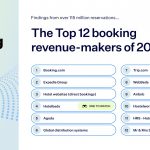In this blog post, we outline four steps to help you understand and adapt to a transitioning digital advertising landscape.
NB: This is an article from Amadeus
As Google and other providers look to phase out the cookie, the use of first-party data, or data that is owned by the brand itself, will be crucial to meet and better target desired traveler audiences. With a privacy-first approach, companies can build transparency and trust with customers while creating successful digital campaigns.
Subscribe to our weekly newsletter and stay up to date
Let’s take a step back…
What exactly is first-party data?
First-party data is collected (with proper consents and disclosures) from your audiences, and includes:
Data from a brand’s website such as first-party cookie data
CRM and PMS data
Newsletter and other brand subscription data
Data from past hotel stays including data from other businesses tied to the property (spa, restaurants, etc.)
Consider these four steps:
#1 Discuss and consult: Work closely with your legal advisors
In order for a hotel property to collect and process personal user and guest data, they need to understand all the consent, data usage and disclosure rules and regulations. As regulations vary from one location to the next, properties must consult with their legal advisors directly on its roles and responsibilities. You should also work with legal and technical advisors to confirm that the necessary technical and security measures are in place.
Remember to issue required legal documentation and publish it online. This may include:
Terms and conditions: This outlines the terms that the user and the website agree are legally binding regarding the website.
Privacy policy: This governs an organization or entity’s handling of personal information.
#2 Disclose: Inform the public of your data collection and usage details within your legal and disclosure documentation
Although this may vary per jurisdiction, data collectors generally share the following:
What data is the property collecting?
Why is it being collected?
How is the data being collected? And specify the usage of:
o Opt-in and opt-out for cookies and other collection methods
o Opt-in and opt-out of other first-party data, such as emails and phone numbers
Where will the data be used?
Vendor or partner data policies, when applicable
#3 Develop brand trust: It leads to quality data collection
Per a recent BCG research study examining data and marketing strategies, brand trust is selected as the second most important purchasing factor following price. When consumers trust a brand, they are twice as willing to share their personal information, enabling brands to build stronger and more targeted digital media campaigns. When companies cultivate consumer trust, customers will be more inclined to share accurate information, ensuring top quality, first-party data for the organization. Building brand trust is at the foundation of data collection and a cultural shift that hospitality business leaders must focus on as businesses transition into a privacy-centric ecosystem.
#4 Deepen your knowledge: Tech updates
Stay on top of industry trends and updates and get in touch with your digital campaign manager to explore new opportunities. Only the property or brand, as data controllers, can determine and instruct their vendors and partners, as their data processors, on how they wish to proceed with its first-party data.
What comes next?
Review the latest tracking and analytics methodologies such as attribution APIs and other conversion modeling functionalities.
Explore new technologies that use identity resolution, allowing for advanced targeting.
Learn the advantages of using a cookie consent management tool in conjunction with a CRM tool.
Read more articles from Amadeus
The post Prepare Your Hotel Digital Marketing Strategy for Post-Cookie World appeared first on Revenue Hub.
































